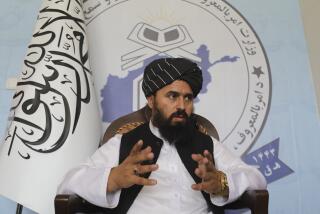Taliban say hackers faked reports of Mullah Omar’s death
In this Murdochian age, it somehow seems inevitable: The Taliban movement says its phones were hacked.
Moreover, the subject was the most sensitive possible, at least in the insurgents’ eyes: the status of Mullah Mohammed Omar, the group’s supreme leader.
The group declared Wednesday that text messages announcing Omar’s death from heart failure were fake, and said the phone logs of its main spokesman, together with the Taliban website, had apparently been tampered with.
Earlier Wednesday, text and email messages, purportedly from accounts used by Taliban spokesman Zabiullah Mujahid, had announced the death of the Amir ul-Momineen, or Commander of the Faithful, as Omar is known. The Taliban leader has been on the run for nearly 10 years, ever since U.S. officials placed a multimillion-dollar bounty on his head in the wake of the Sept. 11 attacks.
Mujahid, whose voice is recognizable to those who have spoken to him, denied in a telephone conversation that he had sent the messages. He said Omar is alive and directing Taliban operations in Afghanistan.
The reclusive Taliban leader has long been thought by Western officials to be based in or near the Pakistani city of Quetta, though there were reports after the killing of Osama bin Laden that he had been moved to another location. Rumors of his death have surfaced periodically over the years.
Soon after the latest reports began circulating, Mujahid and another principal spokesman, Qari Yousef Ahmadi, sent out emails angrily denouncing the actions of a “cunning enemy” who had committed what they described as “technical larceny.”
The statements added that the “technical workers of the Islamic Emirate’s Information and Cultural commission” — in effect, the Taliban’s IT team — had opened an investigation into the incident. Mujahid, somewhat ominously, said the possible role of cellphone companies and Internet service providers would be investigated.
The insurgency has long recognized the importance of technology in disseminating its message. There is a Taliban website in English and Pashto; the Taliban is also on Twitter and recently began tweeting in English.
In recent years, speedy Taliban announcements of attacks against NATO forces and Afghan government targets prodded the Western military to take a more aggressive public-relations stance, utilizing social media including Facebook.
Afghan officials too have sought to discredit the Taliban media machine, which routinely makes exaggerated claims of military triumphs for the insurgents but often includes some truthful element such as the location of a given attack.
This year, the main Afghan intelligence service moved to out one of the group’s main spokesmen, alleging that Mujahid was the pseudonym of a man named Haji Ismail and that he was based in the Pakistani border town of Chaman. The Taliban movement retorted that its messages regarding the war originate from Afghanistan.
Special correspondent Aimal Yaqubi in Kabul contributed to this report.
More to Read
Start your day right
Sign up for Essential California for news, features and recommendations from the L.A. Times and beyond in your inbox six days a week.
You may occasionally receive promotional content from the Los Angeles Times.






